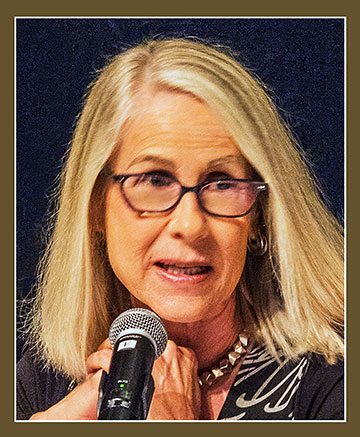
Compassion is about presence, not shameCOFFEE WITH WARREN, with Warren Harbeck |

|
Leslie Davies, Christian panelist at World Religions Conference, sees compassion as presence, not shame. Photo by Warren Harbeck On the eve of Good Friday in Christianity, comments by a Cochrane panelist at last week’s 11th Annual World Religions Conference deserve special attention. The topic was Compassion. (See my column for April 4.) “Compassion is to suffer with another person, just as Christ suffered for and with us,” Leslie Davies said from a Christian perspective. Leslie is principal of St. Margaret Catholic Elementary and Junior High School in Calgary. She is also a global volunteer in humanitarian causes who has learned much about true compassion from the people she has served. She illustrated this with an experience she had some years ago while volunteering at Mother Teresa’s (St. Teresa of Calcutta’s) Kalighat Home for the Dying in Calcutta, India. While en route to Calcutta, Leslie wrote in her diary: “I know it will be the biggest challenge of my life so far. But I also am sure God has led me here. I look forward to it and pray for the courage and strength and grace to learn and grow from the experience.” Upon arriving, she didn’t have long to wait for the lessons to begin. Among the patients at the home was a woman, gentle and unable to speak. She had a badly infected ulcer on her back. Malaria was giving her a high fever, chills and delirium. And on this particular hot, humid day, the woman was incontinent. As Leslie walked past her bed while going about chores, she remembers thinking to herself, “Oh man, not again!” She even hoped that if she kept going, someone else might clean up the mess. “But I didn't keep going,” Leslie says. “I stopped – and I went up to the head of the bed and I looked into her eyes and what I saw there stunned me. When I looked into that poor woman's eyes, I saw shame. In the midst of her fever and the chills that wracked her body, this woman was ashamed that she could not control her bowels. “And I wanted to fall on my knees in the face of her suffering and my own selfishness, I who in the riches of my health and skills was petty enough to pity myself for having to clean up her mess. I stroked her face and held her hand, and from my own shame I did my best to convey to her that she had no reason – no reason at all – to feel shame. "A poor, dying street woman in Calcutta, in her humility, taught me a great lesson that day," Leslie says. It was a lesson in the true meaning of compassion. Leslie captured that lesson in a poem she shared with me a few years ago. She titled it, Feel No Shame: The mute appeal in your eyes
© 2019 Warren Harbeck |